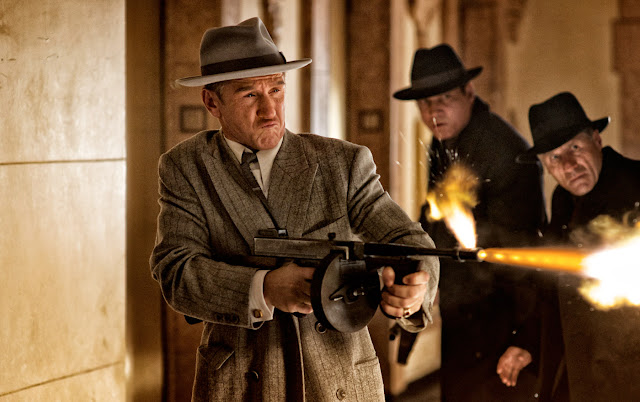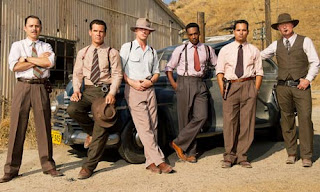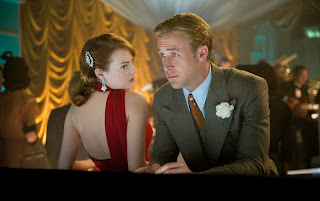 Just for the record, this whole article is riddled with SPOILERS for Gangster Squad. So, you know, read at your own risk.
Just for the record, this whole article is riddled with SPOILERS for Gangster Squad. So, you know, read at your own risk.Okay, I know that’s kind of an abrupt way to start this article, but allow me to explain. In most cop movies, especially ones set in the past, it’s not hard to figure out who’s going to die first. It’s a tradition as old as horror movies, and it’s sad to say but the phrase, “Black guy dies first,” is a trope for a reason. The minority character usually does die, especially if said character gets to be a “symbol for change” or something trite like that.
I don’t think this became a trend because all Hollywood screenwriters secretly hate black people (and Latino and Asian people). It’s really just lazy writing.
When the black guy dies first, what probably happened in the writer’s head was this:
1. “Gosh, this script is awfully white.
2. “Man, I should really make one of these characters not white.”
3. “But who should I change? I mean, I’m white, so I don’t know a whole lot about not being white.”
4. “Probably should change a minor character then.”
5. “Hey, what if this not-white person is really pissed about how much people discriminate against him? That seems like a thing that could happen. And then there would be tension. Tension is good.”
6. “Someone needs to die in this story. The stakes aren’t high enough.”
7. “If the not-white guy dies, then it’s like a sign! When the hero takes out the bad guy, he’ll be enacting justice for everyone!”
And so the black guy dies.
Which brings us handily back around to Gangster Squad and how it completely futzed my expectations.
The story is eerily similar to that of LA Confidential, but basically it goes like this: It’s 1949 and mobster Mickey Cohen (Sean Penn) is taking over LA. He has almost all of the city officials in his pocket, and soon he’ll be the only power on the west coast. Standing in his way is stalwart good cop O’Mara (Josh Brolin), who’s been given jurisdiction by the Chief of Police to take Cohen’s operation out any way he can.
Helping O’Mara are a motley crew of action movie stereotypes. There’s Giovanni Ribisi, playing a genius nerd who does their communications stuff, Robert Patrick as an aging gunhand, Ryan Gosling as a jaded cop who decides to actually take a stand, and Anthony Mackie and Michael Peña as two up and coming cops of color.
Oh, and also Mireille Enos as O’Mara’s seriously awesome wife, and Emma Stone as the requisite femme fatale. Both fabulous, but not momentarily relevant to our discussion. We’ll get back to them later.
So, watching this film, as I’m seeing the team get assembled and figuring out the odds of each of them biting the dust, I noticed something pretty interesting. Each of the people on the team (with the exception of Brolin, because you don’t kill the main character and O’Mara is so ready for death that giving it to him would be cheap) is at equal odds to bite it. I mean, you know someone is going to. It’s a movie about old timey gangsters.
But the real triumph of this movie was that it was hard to tell who was going to go. Would it be Ribisi, whose reason for joining up was to save LA for his family? Or would it be Patrick, whose character was old and had a paternal relationship with the young Peña? What about Mackie, who had a chip on his shoulder about the LAPD’s treatment of the black community? My money was on Gosling, because he played a star-crossed lover, and we know how that always turns out.
My point is this: all of the characters were written in such a way that you would be sorry if they died. No one was a throwaway and at the same time, no one’s pathos was built up so that we could see it falter. It’s the one movie I can point to in a really long time where the characters actually were pretty equally developed. Mostly insofar as we didn’t know a whole lot about any of them, except Brolin’s and Gosling’s, but still.
There is a point to be made in seeing that the main characters in this film were still all white. The main good guys are white, the bad guy is white, the love interests are white white white. But I’ll give props where they’re due, and point out that at least the film avoided the trap of making its non-white characters symbols instead of people.
Oh, and also Mireille Enos as O’Mara’s seriously awesome wife, and Emma Stone as the requisite femme fatale. Both fabulous, but not momentarily relevant to our discussion. We’ll get back to them later.
So, watching this film, as I’m seeing the team get assembled and figuring out the odds of each of them biting the dust, I noticed something pretty interesting. Each of the people on the team (with the exception of Brolin, because you don’t kill the main character and O’Mara is so ready for death that giving it to him would be cheap) is at equal odds to bite it. I mean, you know someone is going to. It’s a movie about old timey gangsters.
But the real triumph of this movie was that it was hard to tell who was going to go. Would it be Ribisi, whose reason for joining up was to save LA for his family? Or would it be Patrick, whose character was old and had a paternal relationship with the young Peña? What about Mackie, who had a chip on his shoulder about the LAPD’s treatment of the black community? My money was on Gosling, because he played a star-crossed lover, and we know how that always turns out.
My point is this: all of the characters were written in such a way that you would be sorry if they died. No one was a throwaway and at the same time, no one’s pathos was built up so that we could see it falter. It’s the one movie I can point to in a really long time where the characters actually were pretty equally developed. Mostly insofar as we didn’t know a whole lot about any of them, except Brolin’s and Gosling’s, but still.
There is a point to be made in seeing that the main characters in this film were still all white. The main good guys are white, the bad guy is white, the love interests are white white white. But I’ll give props where they’re due, and point out that at least the film avoided the trap of making its non-white characters symbols instead of people.
I did say I would talk about the women, though, and I will. While I loved what the film did with its non-white characters, I did not love so much what it did with the ladies. Enos and Stone both give stellar performances here, much to their credit, but I dislike the subtle ways they’re both painted.
Stone’s character, that of a pretty young thing on the mobster’s arm who falls for the cop sworn to take him out, lacks any real sense of agency. For all her bluster and femme fatale-ness, she doesn’t actually do anything until the very end of the movie, and mostly just acts as a catalyst to Gosling’s character.
Enos actually gets it worse. Her character, the heavily pregnant wife of Josh Brolin’s character, is the touchstone for all that is “good” and “pure” in the world. She is constantly put in a situation of worrying about her man, or nagging him, or fretting over his life. In one memorable scene, she’s even attacked in her sleep, and shot at while she goes into labor, giving us one of the more horrific scenes of childbirth I’ve ever come across.
I like her character, I really do, but I hate that she was made to be a symbol of good American values, and didn’t actually get to do anything of her own. Aside from have a baby in a bathtub and traumatize me for life.
I guess what I’m saying is that you take the breaks where you can get them, and it really is a good movie. It’s well written for the most part, compact, and compelling. You really like most of the characters, and the ones you don’t are probably evil anyways. It’s worth watching, even if you do end up rolling your eyes like I did every time a female character is ignored.
But there is such a thing as rewarding good behavior, and Gangster Squad certainly deserves a treat.
Stone’s character, that of a pretty young thing on the mobster’s arm who falls for the cop sworn to take him out, lacks any real sense of agency. For all her bluster and femme fatale-ness, she doesn’t actually do anything until the very end of the movie, and mostly just acts as a catalyst to Gosling’s character.
Enos actually gets it worse. Her character, the heavily pregnant wife of Josh Brolin’s character, is the touchstone for all that is “good” and “pure” in the world. She is constantly put in a situation of worrying about her man, or nagging him, or fretting over his life. In one memorable scene, she’s even attacked in her sleep, and shot at while she goes into labor, giving us one of the more horrific scenes of childbirth I’ve ever come across.
I like her character, I really do, but I hate that she was made to be a symbol of good American values, and didn’t actually get to do anything of her own. Aside from have a baby in a bathtub and traumatize me for life.
I guess what I’m saying is that you take the breaks where you can get them, and it really is a good movie. It’s well written for the most part, compact, and compelling. You really like most of the characters, and the ones you don’t are probably evil anyways. It’s worth watching, even if you do end up rolling your eyes like I did every time a female character is ignored.
But there is such a thing as rewarding good behavior, and Gangster Squad certainly deserves a treat.
 |
| Good boy. |



No comments:
Post a Comment